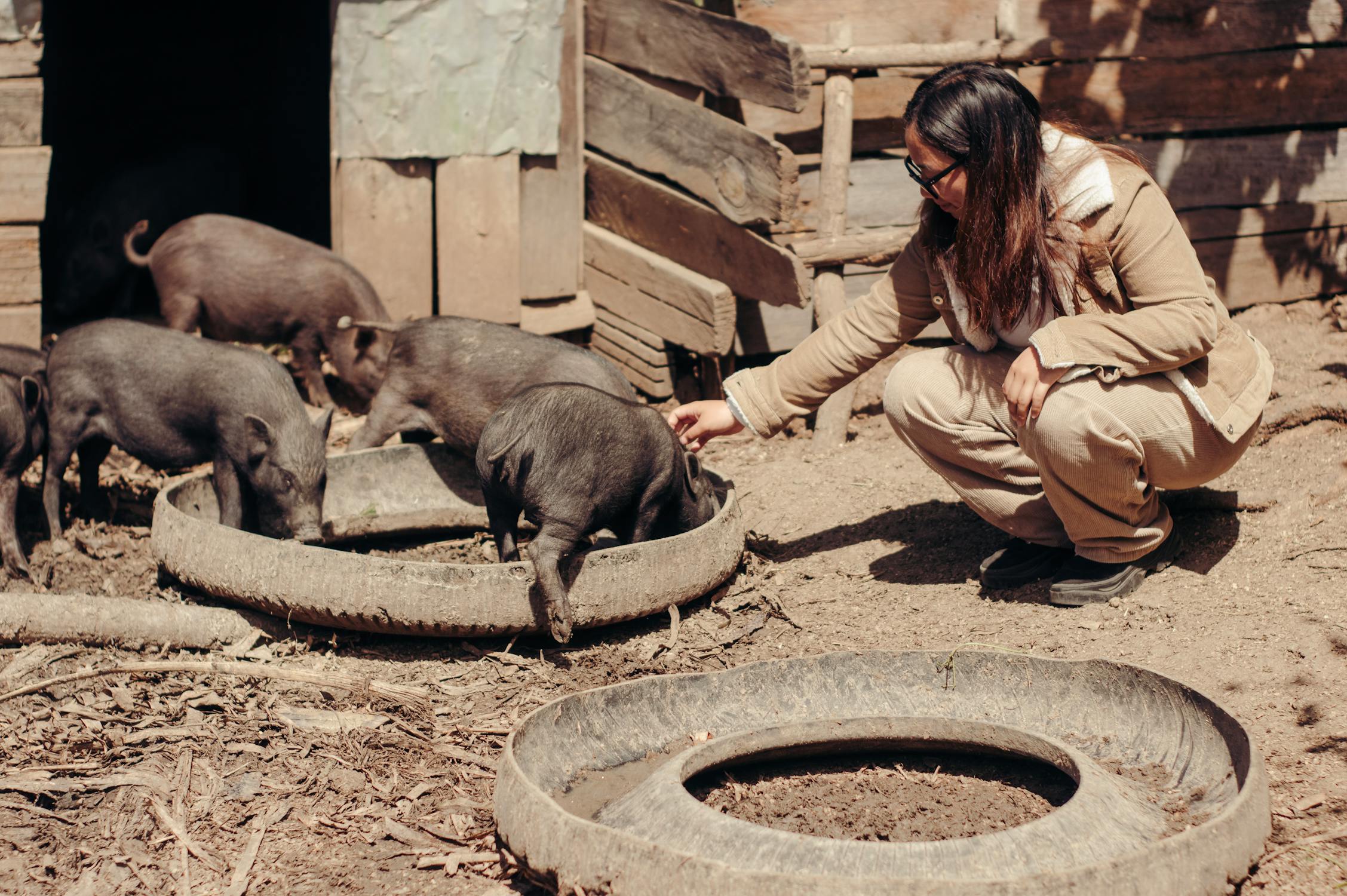$40,000/Year Livestock Feeder Jobs in Canada
Canada has long been recognized for its vast landscapes, diverse communities, and a booming agricultural sector. For immigrants seeking employment opportunities, the agricultural industry offers various prospects, especially in fields such as livestock farming.
One of the roles with substantial demand is that of a livestock feeder, a vital part of the agricultural workforce. With an average annual salary of $40,000, livestock feeder jobs provide a reliable income and a path to integrate into Canada’s economy.
Results
#1. What is your primary reason for considering a marriage visa?
#2. Do you know which documents are required for a marriage visa application?
#3. How soon are you planning to apply for a marriage visa?
#4. Are you aware of the benefits a marriage visa provides?
#5. Which challenge do you think is the hardest part of applying for a marriage visa?
#6. What support would be most helpful to you during the application process?
This article will explore the opportunities available for immigrants to find livestock feeder jobs in Canada, the benefits of these positions, the skills required, and how you can secure such roles.
We will also examine the provinces that offer the highest salaries for livestock feeders and answer some common questions about working in this industry.
Who is a Livestock Feeder?
A livestock feeder is responsible for ensuring that farm animals, such as cattle, pigs, chickens, and sheep, receive the right amount of food and care.
These workers play a crucial role in maintaining the health and productivity of livestock, which directly impacts a farm’s overall success. Livestock feeders may be involved in feeding, monitoring animal health, and managing feed supplies to optimize animal growth and development.
Livestock feeders can work in various settings, including farms, feedlots, and agricultural companies.
Depending on the size of the operation, they may also perform other duties, such as cleaning animal enclosures, assisting with medical treatments, and ensuring the animals are comfortable.
Why Immigrants Should Consider Livestock Feeder Jobs in Canada
Canada’s agricultural sector is one of the largest in the world and plays a significant role in the country’s economy. The demand for workers in agriculture, particularly in livestock feeding, has been consistently high. For immigrants, this field offers several advantages:
1. Stable Income: With an average annual salary of $40,000, livestock feeder jobs offer a steady income, which is ideal for newcomers looking to build a stable life in Canada.
2. High Demand: The agriculture industry faces labor shortages, particularly in rural and remote areas. Immigrants can benefit from these shortages by securing steady work in livestock-related jobs.
3. Work Visa Opportunities: For immigrants without permanent residence, temporary work visas, such as the Temporary Foreign Worker Program (TFWP) and International Mobility Program (IMP), provide pathways to employment in Canada.
4. Pathway to Permanent Residency: Experience in agriculture can help immigrants accumulate valuable points for Canada’s Express Entry system.
Livestock feeders, especially those in high-demand regions, may qualify for provincial nomination programs that can lead to permanent residency.
5. Physical Activity and Outdoor Work: Livestock feeding is an ideal job for those who enjoy outdoor work and staying active. It provides a break from traditional office-based jobs while contributing to the success of a farm or ranch.
Requirements and Qualifications for Livestock Feeder Jobs
While no formal education is typically required for a livestock feeder position, employers may look for certain skills and experience. Here are some common qualifications:
1. Basic Agricultural Knowledge: A general understanding of animal husbandry and farming practices is helpful. While on-the-job training is often provided, knowledge about livestock care and feeding practices can be an asset.
2. Physical Stamina: The work involves manual labor, including lifting heavy bags of feed, cleaning animal pens, and working in varying weather conditions. Physical fitness and stamina are essential.
3. Attention to Detail: Livestock feeders must be able to spot signs of illness or distress in animals and take appropriate action, such as seeking veterinary help or adjusting the diet.
4. Experience in Agriculture: Previous experience working on a farm or with livestock can improve an immigrant’s chances of getting hired. While experience in the field is not always required, it is highly beneficial.
5. Language Skills: While many agricultural jobs in Canada do not require fluency in English or French, communication skills are important for understanding safety protocols and following instructions.
6. Driver’s License: A valid driver’s license is often required, especially if the job involves traveling between different farms or feedlots.
Livestock Feeder Job Responsibilities
As a livestock feeder, you will be responsible for several essential tasks. These responsibilities include:
Feeding Animals: The primary responsibility of a livestock feeder is to provide the correct amount and type of food for each animal. This may involve preparing specialized feed based on the age, weight, and species of the livestock.
Monitoring Animal Health: Livestock feeders need to observe animals for signs of illness or injury. They must be able to report any issues to the farm manager or veterinarian.
Maintaining Feed Storage: Livestock feeders often manage the storage and distribution of feed, ensuring that supplies are well-stocked and properly stored to prevent spoilage.
Cleaning Animal Housing: Maintaining clean and hygienic conditions in animal pens and barns is a critical part of ensuring livestock health.
Assisting with Breeding and Calving: In some cases, livestock feeders may assist with breeding or calving, ensuring that new animals are properly cared for.
High Paying Unskilled Jobs in Canada
Job Title Average Salary (CAD)
Laundry Attendant $3k/Month
Assembly Line Worker $25/Hour
Bicycle Courier Jobs $20/Hour
Fast Food Worker $20/Hour
Top Provinces for Livestock Feeder Jobs in Canada
The demand for livestock feeders is present across Canada, but some provinces stand out for offering higher wages and more job opportunities.
The table below outlines the average salaries for livestock feeders across the top five provinces in Canada.
Province Average Annual Salary (CAD)
Alberta 45,000
Saskatchewan 42,000
Manitoba 40,000
Ontario 38,000
British columbia 40,000
How to Apply for Livestock Feeder Jobs in Canada
1. Research Job Listings: Job search engines like Indeed, Monster, and Workopolis are excellent starting points for finding livestock feeder job openings. Check agricultural-focused websites like AgCareers and Farm Job Search for niche listings.
2. Prepare Your Resume: Highlight any relevant experience, including farm work, animal handling, or previous roles in the agricultural industry. Even if your experience is limited, emphasize your willingness to learn.
3. Apply for Work Permits: If you’re not yet a Canadian citizen or permanent resident, you’ll need a valid work permit to secure employment as a livestock feeder. The Temporary Foreign Worker Program (TFWP) can be a helpful avenue for obtaining employment in agricultural roles.
4. Network in the Community: Consider reaching out to local agricultural associations or joining online forums where other farm workers gather. Networking can provide valuable leads for job openings.
FAQs on Livestock Feeder Jobs in Canada
How much do livestock feeders earn in Canada?
On average, livestock feeders earn between $30,000 and $40,000 annually, with some provinces offering salaries upwards of $45,000. The salary can vary depending on the region, experience, and the specific type of livestock farm.
Do I need a work permit to work as a livestock feeder in Canada?
Yes, if you are an immigrant, you will need a work permit to secure employment in Canada. Temporary permits through the TFWP or other visa programs can help you find work.
What are the key skills required for livestock feeder jobs?
Skills required include physical stamina, attention to detail, basic knowledge of livestock care, and the ability to follow safety and feeding protocols. A valid driver’s license is often beneficial.
What are the benefits of working as a livestock feeder in Canada?
Benefits include a steady income, the opportunity for permanent residency, the ability to work outdoors, and contributing to the success of Canadian agriculture.
How can I find livestock feeder jobs in Canada?
Job search engines, agricultural job boards, and networking within the community are the best ways to find opportunities. Many farms also advertise job openings directly.
Can I work as a livestock feeder in Canada if I don’t have experience?
Yes, it is possible to work as a livestock feeder in Canada even without prior experience. Many employers offer on-the-job training for individuals willing to learn.
However, any prior experience in agriculture or animal care can be a strong asset and may help you secure a job more quickly.
What kind of hours can I expect as a livestock feeder?
Livestock feeders often work long hours, particularly during feeding seasons or when animals require special care. Most jobs are full-time, but they may also involve early mornings, weekends, or occasional night shifts, especially in larger operations.
It is important to be prepared for irregular hours depending on the employer and the nature of the farm.
What are the working conditions like for livestock feeders?
Working conditions for livestock feeders can be physically demanding. The job often involves lifting heavy feed bags, working outdoors in various weather conditions, and performing repetitive tasks.
You will also be in close proximity to animals, which may sometimes involve dealing with difficult or large livestock. Being prepared for these physical aspects is essential.
Before You Go
Livestock feeder jobs in Canada offer promising opportunities for immigrants looking to settle and build a life in Canada’s agricultural sector.
With competitive wages averaging $40,000 per year and a consistent demand for skilled workers, this profession presents a stable career path.
Furthermore, the physical nature of the work and the benefits of working outdoors make it an ideal choice for those who enjoy hands-on roles in rural settings. For immigrants, it’s not just about earning a living—it’s about becoming an integral part of Canada’s vibrant agricultural community.











